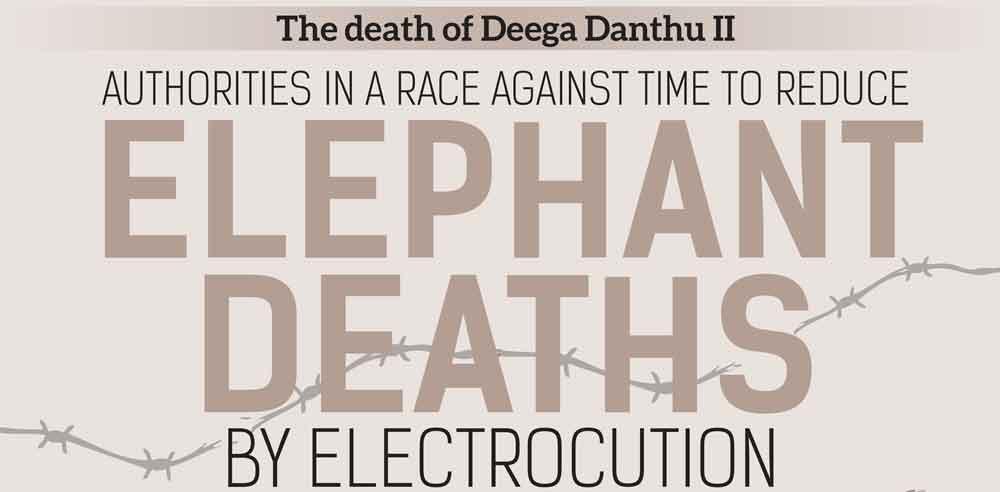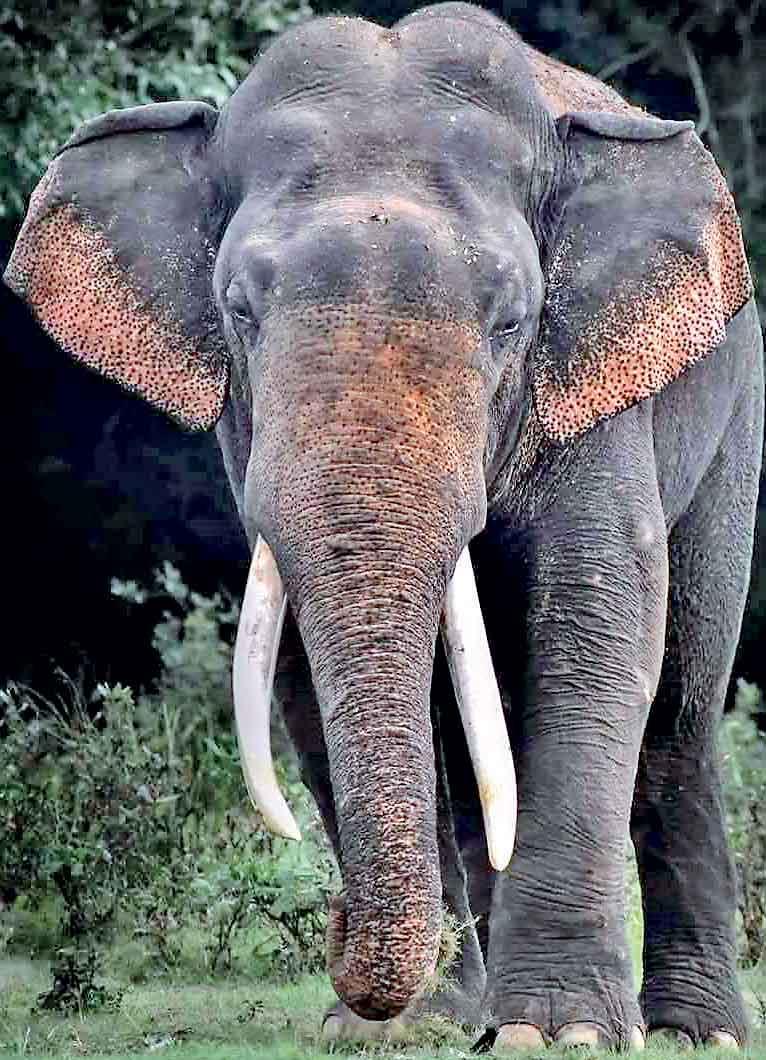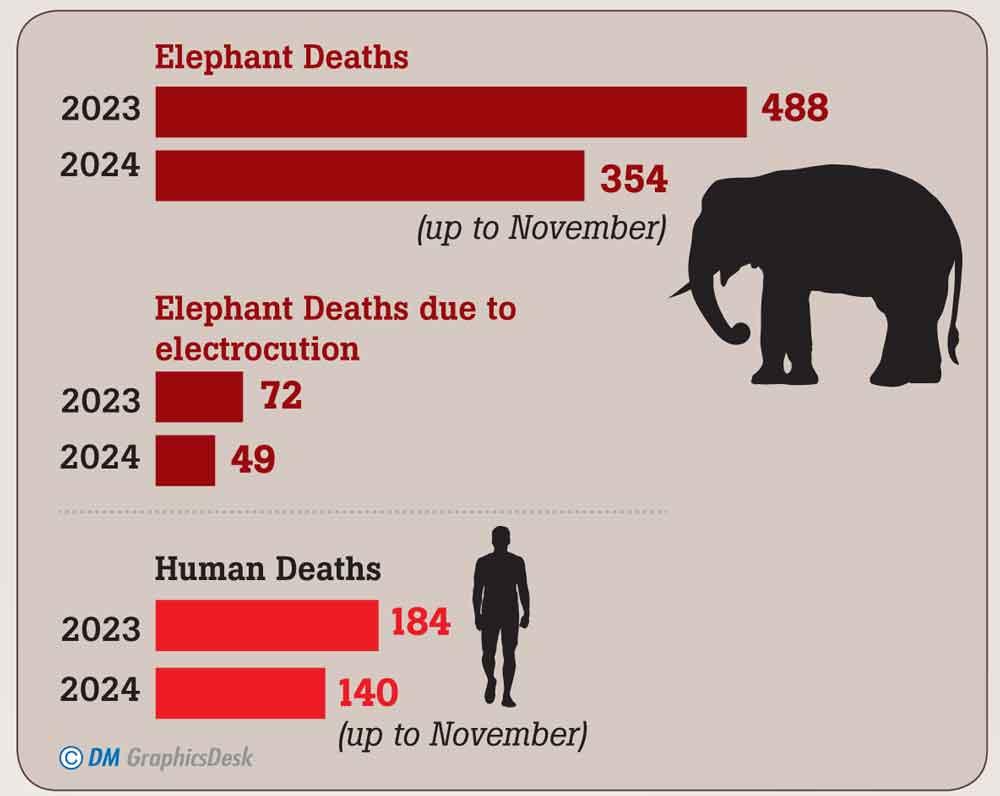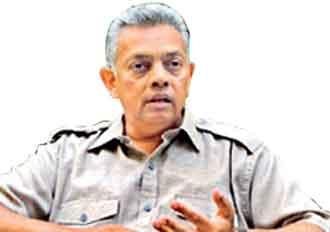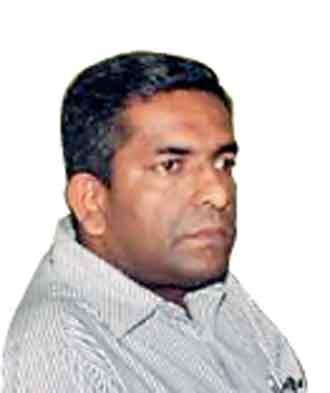The death of Deega Danthu II Authorities in a race against time to reduce Elephant Deaths By Electrocution-by Kamanthi Wickramasinghe
Source: Dailymirror
Deega Danthu II
– Image courtesy Travel with Dinuka
The death of Deega Danthu II, an iconic tusker that roamed around Kala Wewa, Balalu Wewa and adjacent jungles in Kekirawa has sparked serious concerns about interventions taken by authorities including the Department of Wildlife Conservation (DWC) to conserve and protect these majestic species. Environmentalists opine that the state incurs a heavy loss in foreign exchange whenever an iconic tusker or an elephant is killed because many tourists travel from far and wide to view these species in their natural habitats.
However, as electrocution continues to be a rather inhumane method to deliberately kill elephants, authorities are making every possible effort to detect illegal electric fences and reduce elephant deaths and potential risks to humans.
Programme to detect illegal electric fences
By the end of November, Sri Lanka had lost 354 elephants and according to environmentalists, there seems to be an improvement from last year when Sri Lanka lost 488 elephants. On the other hand, human deaths have reduced from 184 in 2023 to 140 at the end of November 2024.
“Illegal electrocutions occur when the electricity supplied by the CEB is either connected directly to a fence or when it is connected to an electric fence through an energiser that is faulty,” said renowned elephant conservationist Dr. Sumith Pilapitiya. “Either way whoever touches the fence gets electrocuted and dies, be it a human, elephant or any other wild or domesticated animal. All electrocuted elephants, including Deega Danthu 2, died in this manner,” he added.
I feel there should be regulations in place so that if a faulty fence is identified, a more stringent penalty than just requiring them to rectify the fault is needed
Renowned elephant conservationist Dr. Sumith Pilapitiya
Speaking about DWC’s attempts to reduce electrocutions of elephants, Dr. Pilapitiya said that the Director General of DWC has initiated a programme to detect such illegal fences in 2024. As a result, DWC officers have inspected 2009 privately constructed electric fences and found that 583 were faulty. “According to the DWC, the owners of such fences have been informed about the faults and they have been instructed to discontinue using the fence until the faults are rectified. Of the fences inspected, only 147 have been constructed according to DWC standards and DWC states that these fences recorded no issues. This programme seems to be paying dividends as the number of elephants electrocuted in 2024 is less than 2023. Data shows that 72 elephants died due to electrocution in 2023, whereas up to the end of November this year the number of elephants dying due to electrocution has been 49. The continuation of this programme in 2025 should yield even better results,” he further said.
However, environmentalists believe that there should be a formal mechanism in place to ensure that privately constructed fences comply with proper standards. Dr. Pilapitiya observed that even though regulations are in place, compliance monitoring is weak, like in everything that happens in Sri Lanka. “Unless there is stringent compliance monitoring, on the lines started by DWC in 2024, this problem will continue. I also feel there should be regulations in place so that if a faulty fence is identified, a more stringent penalty than just requiring them to rectify the fault is needed. The DWC and CEB should work jointly to see if the recipient of the electricity supply from CEB can be charged under the National Electricity Act for misusing electricity and causing the death of an elephant. I believe that if there is a provision under the National Electricity Act to discontinue the supply of electricity to a household that illegally connects mains electricity to a fence for a period of 6 months or 1 year, that will be an effective deterrent to this practice.”
Elephants as
‘ecosystem engineers’
According to statistics, in 2023, around 72 elephants were killed due to electrocution while 49 were killed in 2024. Even though the name given to a tusker and tusk-less elephant are different in the vernacular, elephant experts opine that a tusker is still an elephant—Elephas maximus maximus—and therefore it makes no distinction between tuskers and tusk-less elephants.
Explaining the role played by elephants in an ecosystem, Dr. Pilapitiya said that elephants are considered “ecosystem engineers” because they positively influence their ecosystem. “Some of the ecosystem services provided by elephants are as follows:
(i) Elephants create habitats which are beneficial for other species;
(ii) they maintain grasslands;
(iii) they create trails in the forests that other animals can use;
(iv) they fertilise the land with their dung;
(v) they disperse seeds through their dung;
(vi) by breaking branches in the forest while feeding from tall trees make it also available for smaller animals;
(vii) According to latest studies conducted in Gabon, forests with elephants sequester much more carbon than forests without elephants.
“All elephants, including tuskers perform these ecosystem services. In addition, a tusker may attract more attention during elephant viewing tourism, as tuskers are somewhat scarce in Sri Lanka, which is an economic asset, rather than an ecosystem service,” he added.
Approaches to encourage coexistence
For people in rural areas of Sri Lanka, elephants have become an economic liability as they continue to damage crops and property while imposing threats to life. It has been observed that with more development projects, people and elephants will have to survive on an increasingly shared landscape.
Elephant deaths by electrocution have reduced by 30-40% in 2024 when compared to 2023
DWC Director General M. G. C Sooriyabandara
When asked about the approaches that could be taken to empower rural communities to protect elephants, Dr. Pilapitiya said that it is difficult to expect rural communities to protect elephants if their crops and properties are damaged by elephants. “We have to explore ways to make elephants an economic asset to rural communities. The day that happens, rural communities will protect elephants. We have to make serious attempts to introduce community based elephant viewing tourism in areas which are on tourism routes, so that by providing elephant viewing opportunities outside the protected areas, such as on the grasslands of numerous tanks and reservoirs that dot the rural landscape as well as even have tourists in watch huts at night where elephants frequent would result in rural communities earning money from elephants. This would be one way of rural communities wanting to protect elephants. I am also a strong advocate of a portion of wildlife tourism revenue from National Parks of DWC and Eco Parks of the Forest Department being channeled to human-elephant conflict affected communities. I have been proposing this to several Governments to no avail, but I hope that the present Government considers such a move. The logic for this is clear. The Government of Sri Lanka earns a large revenue from wildlife tourism, particularly from elephants. Can you imagine a visit to a National Park if there are no elephants? Elephants range over large areas creating a conflict with rural communities. So why shouldn’t the Government share a percentage of the revenue from tourism in National Parks with HEC affected communities. If such a direct link is made the communities will be discouraged from killing elephants as without elephants, they would lose this revenue source. A lot can be done to convert an elephant from an economic liability to an economic asset, if there is the political will,” Dr. Pilapitiya added.
What could the new government do?
A National Action Plan (NAP) for Human-Elephant Conflict Mitigation was prepared by a multi-stakeholder Presidential Committee chaired by Dr. Pritiviraj Fernando, who is an internationally recognised Elephant Researcher, in 2020. But according to Dr. Pilapitiya there had been no directive to implement the NAP until October 2022 when a multi-stakeholder Presidential Committee was appointed to facilitate and oversee the implementation of NAP. “But no funds were allocated to the respective implementing agencies. However, the committee managed to obtain funding from existing World Bank and Asian Development Bank projects in the irrigation/agriculture sector to commence implementation in Kurunegala and Anuradhapura Districts. The NAP is a very good action plan based on science and all key actions have been pilot tested and found to be effective in human-elephant conflict mitigation. There are many actions that have been implemented even at present. The new Government should implement the existing NAP rather than try to come up with another action plan. There is provision under the NAP to review actions for effectiveness and make adaptations or introduce new actions after a period of 2 years of implementation. I strongly suggest that the new Government proceed with the implementation of the NAP making revisions as needed. If not we will be preparing plans rather than doing anything substantial to mitigate the conflict.”
He further said that the Director General of DWC initiated a program of effective fence monitoring and awareness among HEC affected villages. “This programme seems to be working because the data shows that there were 488 elephant deaths in 2023 whereas in 2024 it has been reduced to 354 at the end of November. Similarly human deaths have reduced from 184 in 2023 to 140 at the end of November 2024. Prior to 2024, the elephant and human deaths have been on an increasing trend every year. Meaningful steps have been taken to address HEC, but we must be realistic. It will be a slow process to reduce HEC to manageable levels. It cannot be done overnight and also not to a political agenda,” he said in conclusion while adding that as an elephant conservationist he is a strong believer in protecting all elephants and that there should be a goal to stop all deaths of elephants through electrocution, and not only tuskers.
Reduction in elephant deaths due to electrocution – Sooriyabandara
Echoing similar sentiments, DWC Director General M. G. C Sooriyabandara said that elephant deaths by electrocution have reduced by 30-40% in 2024 when compared to 2023. He further said that the CEB receives the same information that the DWC receives in the event of an electrocution of an elephant. “Therefore they need to take action regarding these perpetrators.”
He further said that the suspect who was arrested in connection to Deega Danthu’s death is still in remand and that it is up to the courts to deliver a judgment. “Our responsibility is to submit evidence only.
CEB will take legal action if the National Electricity Act has been violated – Eng. Parakramasinghe
According to the Electricity Act of Sri Lanka, no person can make or change a connection to a consumer’s installation without the consent of the Transmission and Distribution Licensee. The connection must also comply with the Grid Code, Distribution Code, and Safety and Technical Standards.
Illegal electricity connections are a criminal offense under article 255 of the Criminal Code. They can have negative effects on the bills of other consumers, the state’s tax collection, and the safety of neighbors.
When asked about tusker Deega Danthu’s incident, CEB’s media spokesman Eng. Dhanushka Parakramasinghe said that when they investigated the incident they found that the suspect had provided electricity to an illegally constructed electric fence around his residence via a battery. “When they say illegal electricity connection they actually refer to an illegally constructed electric fence to chase away elephants. Usually it is the DWC that permits individuals to setup electric fences.”
“The CEB usually provides one connection per consumer and if there are two houses on the same land, they still need to obtain electricity separately. Nobody can even have a shared connection. The Act specifically states how consumers are allowed to obtain connections to their private residences. Therefore in the event that we are informed about an illegal electricity connection supplied by a CEB connection we will be bound to take legal action,” Parakramasinghe further said.



